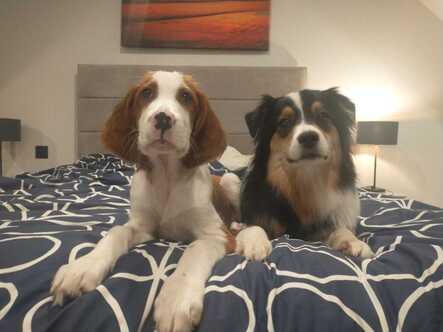|
I was asked by Bridgwater College this week to be a guest speaker for one of their City & Guilds groups at the Animal Management centre. I am a guest lecturer for their adult short courses on Canine Behaviour but being asked to speak in front of teenagers to me was quite another request! I was really quite nervous and worried that I wouldn’t get any engagement during my lesson. Well, the good news is that they were a wonderful group and were very happy to engage with me and play some fun clicker games (well I did pay with Smarties!!).
One of the tasks I asked them to complete was to think of all the activities a dog would like to do. If they were given choice, no barriers such as doors or locations, what do you think your dog would choose to do? Running? Chasing? Swimming? Sunbathing? Chewing? Eating? Sleeping? It’s actually something I often ask my behaviour clients to consider as it gives us a real insight into your dog’s personality. I then asked them to write a list of things we want our dogs to do. Suggestions were: come back when called, walk nicely on the lead, don’t roll in fox poo, don’t chew the furniture, don’t steal the cake off the counter! We then put both the lists together and it quickly dawned on them that they don’t match; they don’t match at all! Now this doesn’t mean our dogs cannot be trained to have skills that we need for them to be safe and a lovely member of society, but it’s important to know that most of what we want our dogs to do aren’t actually what they would choose to do. Come back when called or chase a rabbit. Ignore the food left out on the counter or grabbing a quick bite. Walk really slowly, at human pace, rather than get to the fields as quickly as possible. Can you see why some skills we need from our dogs will take time to teach them. Most of you know we have a new member to our household – Bramley will be 6 months next week and he is still very much learning all the skills we need from him. A lot of what we are still doing is management, so that he cannot rehearse unwanted behaviour. For example, when we walk in areas where other dogs are around, he is mostly on his long line, because I know he will want to go and say hello to all of them. I don’t want him to learn that it’s ok to go up to every dog that we come across. That is not good dog manners as lots of dogs won’t want to interact with him. So to keep him safe and be respectful of others, we have to manage him as his recall isn’t strong enough yet to trust that it will work. This week he has decided that the rug in our lounge is something he wants to chew, so we have removed the rug. He is teething at the moment, and he is looking for lots of things to chew, so we are giving him lots of appropriate chew toys, but also still managing his environment so he doesn’t get it wrong. The expectations we have on our dogs that they should just know and understand is usually too high. Think back to what they would choose to do and what we need from them. I want to encourage you that all those skills are very possible to teach. Through fun, play, rewards and setting them up for success, you really can enjoy the journey along the way until they can be given more freedom and be trusted to have learnt the ‘rules’ that we need from them. If you want help with any training or behaviour issues, don’t hesitate to get in touch. Jo x
0 Comments
Pain isn’t training. Fear isn’t training. Discomfort isn’t training. Intimidation isn’t training. Violence isn’t training. Aggression isn’t training. They are not training styles. They are not differences of opinion. These are all forms of coercive control. Do you want to teach/train/care for dogs, or do you want to coercively control them? - there’s a big difference. Shay Kelly wrote this recently and it hit home so hard that I had to share it with you all. I spend a lot of my time worrying about people using punishment-based training methods as it breaks my heart. I see it all over social media, although I do try to avoid it. I know of so many well-meaning dog owners seek help with their dog and end up with trainers that show them ‘how to be the boss’ or make them feel like a failure because they let them on the sofa or sleep on the bed. They aren’t being a ‘pack leader’ and that’s why their dogs are misbehaving. They are shown how to use techniques that cause their dogs to become fearful of the consequence of them doing a certain behaviour. They must ‘correct’ unwanted behaviour. Does it stop the behaviour – probably! If it causes enough pain/discomfort/fear than yes that behaviour will reduce or stop however the fall out of doing it to me to too great to even consider using these methods. Our dogs trust us; we have full control over every element of their life. They are not trying to dominate us. They are not trying to misbehave just to make your day harder. They are probably just ‘being a dog’ and doing dog behaviours. That doesn’t mean you cannot spend time training them, showing them how you want them to behave and to have rules and boundaries. To keep them safe and to have any enjoyable life together, but that shouldn’t mean a life of stress, anxiety and worry. I know I have written similar posts before, and I know I will write them again. I can only do my best with the people that are wanting to work with their dogs, to get the best trusting loving relationship possible. I am just trying to guide those people that might not be aware that they are other ways to help our dogs that do not require fear or intimidation. Our dogs are with us for such a short time; you are their whole world so make sure that their lives are as enjoyable as possible. Reward based training doesn’t mean allowing dogs to not have any rules or boundaries. I want them to listen to me when I need them to respond, to have manners to live in our human world, however I am not prepared to use any methods that damage my relationship with them and cause any distress. If they are getting it wrong and doing something I don’t like – I need to reflect on what my expectations are compared to how much training I have done with them. If you haven’t spent time showing them what behaviours you want them to do (or not do) then you cannot expect anything other than they will be a dog! Be proud of using reward-based training methods, show them off to anyone that is interested and let’s show everyone that there is no need to use punishment in training. Jo x (Photo of Hallie & Bramley on my bed!) |
Archives
June 2024
|
|
© COPYRIGHT Paws4teaching 2023
Terms and conditions |





